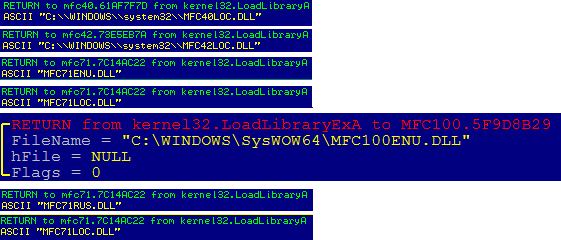Many application create temp files. In the past it was completely random and various directories were chosen depending on application developer’s whim, nowadays the file names are often somehow predictable (as long as the app is legitimate, that is) and both placed inside the %TEMP% folder and named using a pattern that contains a unique prefix followed by a digit, or a number. We can quite often encounter them during forensic investigations. And if you are wondering how these temp. files are created – the applications that know how to behave typically use a Windows API called GetTempFileName; it allows programmers to specify a prefix used by temporary files used by their application. Programmers often specify prefix longer than 3 characters, but the API is using only the first 3 characters as explained in the API description on MSDN:
lpPrefixString [in]
The null-terminated prefix string. The function uses up to the first three characters of this string as the prefix of the file name. This string must consist of characters in the OEM-defined character set.
It may be handy to get familiar with a few well-known temporary file names and prefixes as it may allow us to recognize specific temporary file names families, and potentially use this knowledge to reduce data for analysis (of course, don’t do it blindly).
The list below contains popular temp. file names / prefixes – I am also including other well-known temporary file names:
- C:\~GLC1034.TMP – side-effect of running Wise Installer; stage 2
- %TEMP%\<digits>.tmp – typically caused by GetTempFileName API called with an empty prefix (or, file is created ‘manually’)
- %TEMP%\7zS<digits>.tmp – side-effect of running Self-Extracting installer based on 7z
- %TEMP%\~DF<hexdigits>.tmp – side-effect of running a Visual Basic Application; described in my older post
- %TEMP%\~dfs<digits>.tmp – dropped by Adware.DomaIQ
- %TEMP%\GLB<digits>.tmp – side-effect of running Wise Installer; stage 1 – this is a stub dropping DLL performing the installation (WISE*.dll)
- %TEMP%\GLC<digits>.tmp – side-effect of running Wise Installer; this is the WISE*.dll – a DLL performing the installation
- %TEMP%\GLD<digits>.tmp – side-effect of running Wise Installer; stage 3
- %TEMP%\GLF<digits>.tmp – side-effect of running Wise Installer; stage 3
- %TEMP%\GLG<digits>.tmp – side-effect of running Wise Installer; stage 3
- %TEMP%\GLI<digits>.tmp – side-effect of running Wise Installer; stage 3
- %TEMP%\GLJ<digits>.tmp – side-effect of running Wise Installer; stage 3
- %TEMP%\GLK<digits>.tmp – side-effect of running Wise Installer; stage 3
- %TEMP%\GLL<digits>.tmp – side-effect of running Wise Installer; stage 3
- %TEMP%\GLM<digits>.tmp – side-effect of running Wise Installer; stage 3
- %TEMP%\GL<other letter><digits>.tmp – possible side-effect of running Wise Installer; stage 3
- %TEMP%\IXP<digits>.TMP – directory created by old-school installers developed using IEXPRESS
- %TEMP%\nsi<digits>.tmp – side-effect of running Nullsoft Installer
- %TEMP%\nst<digits>.tmp – side-effect of running very old Nullsoft Installer; it uses a hardcoded ‘nst’ as a prefix
- %TEMP%\ns<other letter><digits>.tmp – side-effect of running older Nullsoft Installer; it uses a random letter following the prefix ‘ns’
- %TEMP%\scs<digits>.tmp – side effect of running ntvdm.exe on Windows XP; usually two temporary files containing the same content as autoexec.nt and config.nt
- %TEMP%\sfx<digits>.tmp – side-effect of running GkWare Installer
- %TEMP%\stp<digits>.tmp – side-effect of running Wise Installer; stage 1
- %TEMP%\sxe<digits>.tmp – self-extracting executable, a custom installer often used by malware (I am not sure who developed it, it could be some old legitimate installer, or even Windows) – it is dropping a compressed clean DLL (SZDD at the top of the file – usually sxe1.tmp), the DLL is decompressed (usually sxe2.tmp) and reveals itself to be just a decompression library (only one exported function DllInflate), and finally sxe3.tmp is the payload
I am still crunching some data, so there will be part 2.
